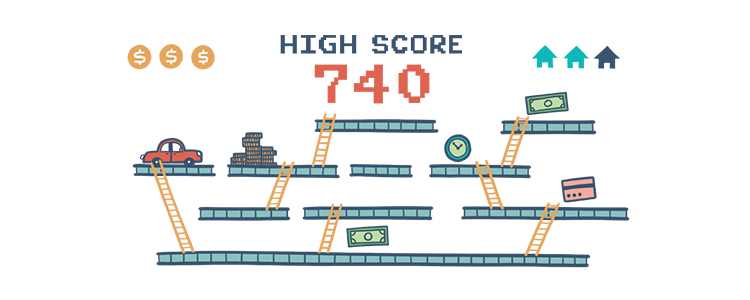Improve Your Credit History

First-time borrowers often have anxiety about low credit scores. They may not have a history of borrowing because they're young, they've never taken out a loan, or even had a credit card.
If you’re getting ready to shop for home mortgages, or any kind of large loan it’s a good idea to begin working on your credit history and getting that score up. To do that, it’s important to know the factors that affect your FICO score:
- Making payments on time: 35%
- Overall debt: 30%
- Length of credit: 15%
- New credit applications: 10%
- Types of credit: 10%
Know Your Score
You can only fix something when you know it’s broken, and knowing your credit score is the first step to helping it go up. Under the Fair Credit Reporting Act, you have a right to request your own credit report from a credit bureau to review it. This allows you to dispute any errors by writing to the relevant credit bureau, which must investigate the dispute within 30 days.
Start Building Credit
Starting a credit history is as simple as signing up for a credit card. Use a credit card to pay for everyday items and set up utility bill payments online through a credit card account in your name. Keep in mind to avoid accumulating debt by paying off the balance in a timely manner.
Don’t Let Your Balance Go Past-Due
Your payment history makes up 35% of your score, making it the most important factor of your credit. The more behind you are on your payments, the more it hurts your credit score. Try to pay off your outstanding balances in full rather than carrying it forward. In addition to avoiding interest payments, it will reflect favorably on your credit report when a lender updates your account status to "paid in full."
Don't Use ALL Your Credit
A key to scoring favorably on your credit is leaving most of it unused. Experts agree that if you use no more than 30% of your available credit, it affects your credit score positively. For example, if you have a 3 credit cards, two with a limit of $1,500 and one with a limit of $2,000, you have $5,000 total credit available. Keeping your combined balance under $1,500 (30% of $5,000) will help maintain a good credit score, because it shows lenders that you are able to use your given credit responsibly.
Avoid Applying for More Credit
When you apply for a new line of credit, lenders perform what is called a “hard inquiry” into your credit. This review of your credit itself affects your score. Applying for credit a number of times in a short timeframe sends a red flag to lenders who might assume that you’re in dire financial straits. So, if you are in the process of repairing a low credit score, avoid making any new applications for credit.

FHA Loan Articles
August 10, 2023FHA loans have specific rules and requirements for borrowers who have filed for bankruptcy. The guidelines can change over time, so it's essential to consult with a qualified lender or FHA-approved counselor for the most up-to-date information.
August 3, 2023FHA loans are primarily designed to help individuals and families purchase homes for use as their primary residences. Rules for these loans generally discourage their use for investment properties or rentals. However, there are exceptions that come with strict rules.
July 29, 2023One crucial aspect of FHA loans that borrowers need to understand thoroughly is debt ratios. In this article, we look at how they can impact your ability to secure financing for your dream home. Debt ratios help lenders understand a borrower's creditworthiness and any risks associated with the loan.
July 21, 2023Investing in a multi-unit property can be an excellent way to build wealth through rental income and property appreciation. FHA multi-unit property loans make this opportunity more accessible to a broader range of individuals. You must occupy a unit as your primary residence within 60 days of closing the loan.
July 15, 2023To qualify for an FHA loan, you must meet certain employment requirements. In this article, we'll dig into the FHA loan employment requirements so that you can understand what's needed to get approved for this type of mortgage.
July 7, 2023Manufactured homes, sometimes referred to as mobile or modular homes, are factory-built residences designed to meet or exceed national building codes set HUD. They offer cost savings and energy efficiency, making them an attractive housing option for many Americans.








